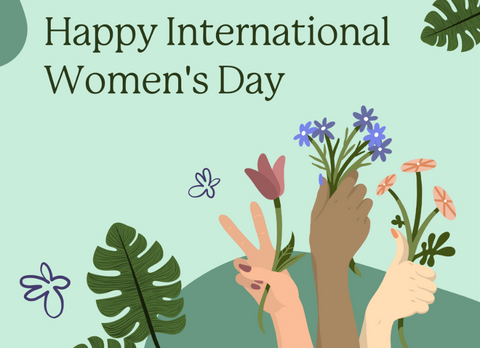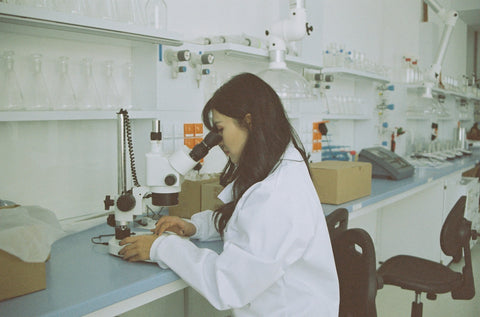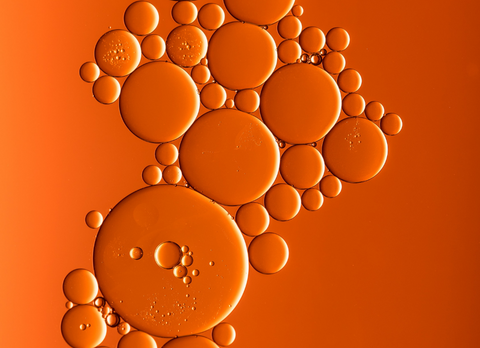The Exciting Times of Women’s Nutrition Science
Although food and nutrition have been studied over the centuries, the role of food and nutrition on human health (modern nutritional science) is extremely young. Who were the notable women whose research contributions helped progress our understanding? How does nutritional science affect women’s health now? For International Women’s Day 2022, let’s take a moment to explore how women’s nutrition science has changed.

By Nina Sabat
- The emergence of human nutrition science
- The female pioneers in nutritional science
- Today nutritional science is improving women’s health
- 14 formulations for supporting women’s health
The Emergence of Human Nutrition Science
From the Greek physician Hippocrates in 400 BC to British navy physician James Lind in 1747, people have been intrigued by the connection between food and health. However, it was Lavoisier in 1770, with his understanding of metabolism, and the means by which food and oxygen created energy, who earned the title ‘The Father of Nutrition’. Decades later, carbon, hydrogen, nitrogen, and oxygen were all connected to food and health, and the investigation into the nutrients in food gathered pace.
The early 1900’s marked the beginning of the ‘era of vitamin discovery’. [1] This was a time where most of the major micronutrients were isolated and synthesised. The first vitamin to be isolated, or ‘vital amine’ as they were known back then, was thiamine, in 1926. Unsurprisingly, most research focused on diseases caused by single nutrient deficiencies, and considered simplified measures such as dietary fat, protein metabolism and the energy density of the diet.
The rise of women in science coincided with this era of discovery. [2] Women scientists were mostly encouraged to work in ‘women’s’ departments. But as they researched issues about women, children, and food, the created a body of scientific papers which focused on nutrition science for humans.

So, who were these women who were instrumental in the development of human nutrition science? Their names may not be well-known, but with the approach of International Women’s Day 2022, it’s time to say hello to several female pioneers.
The Female Pioneers in Nutritional Science
Who were the women responsible for the research and studies which helped progress understanding in the science of nutrition? How did their body of research instruct how people eat, back then and even now?
There are many notable scientists whose names could be mentioned, but here’s a brief introduction to a fabulous four.
- Dame Harriette Chick (born 1875)
Why is wholegrain or wholemeal the healthier option? Well, it’s more nutrient dense than when it’s processed – such as in white rice, white bread, or white pasta. During WW1 this was particularly relevant, as soldiers eating army rations often presented with scurvy and beriberi. A working hypothesis suggested that this was due to the restricted food rations they ate. British researcher, Chick, worked in a team that proved this theory to be correct.
Chick was the first woman to hold a position in the only research institute in Britain. In her later research, she made the link between food processing, nutrient loss, and disease. She discovered that the B vitamin, thiamine, was in the outer branny layers of rice grain, that processing removed it, and that dietary deficiency then led to beriberi disease.
- Agnes Fay Morgan (born 1884)
Any woman at the age of menopause will know the importance of maintaining their bone strength, and that an adequate intake of nutrients like vitamin D, calcium, and phosphorus is needed. Morgan’s research identified the role of these nutrients in maintaining bone health. A woman on a mission, she was motivated by a desire to establish a solid scientific foundation for the practices in nutrition taught at the time.
- Elsie Widdowson (born 1906)
With a basic training in chemistry, Widdowson studied the chemical composition of food at Imperial College London. Mentored by Robert McCance, they later collaborated to produce the publication ‘The Composition of Foods’ in 1940. It’s a book that has stood the test of time. Seventy years later, I remember referencing this tome when I was studying Nutritional Therapy.
- Doris Howes Calloway (born 1923)
Calloway made a prolific contribution to the understanding of nutrition on health. Her topics of research benefitted distinct populations of people. Following surgery do you recover faster if you start moving about and eating sooner, rather than later? Is there a way to identify lactose intolerance just from a breath analysis? When considering women’s health, is there a recommended amount of protein to eat daily if you’re pregnant, menstruating or elderly?
Guess whose research provided answers to these questions? Correct! Calloway.
With just the briefest of introductions you can see some of the significant contributions women scientists have made which furthered nutritional science. Let’s delve deeper and consider nutritional science for women. How does our current understanding of foods and their nutrients help women manage their health?
Today Nutritional Science is Improving Women’s Health
Think how much nutritional science has progressed since the 1800’s. There is a much greater understanding of the macronutrients and micronutrients derived from our food and how they influence health. Along with vitamins and minerals, phytonutrients have been identified, like resveratrol, carotenoids, and phytoestrogens. Complexes of these nutrients are easily available as supplements, and there are continuous advances in how they are produced and used for their therapeutic effect.
Liposomal vitamin C for improving skin, hair, and nails
Take vitamin C, for example.
From the very first understanding of how certain foods prevented sailors from developing scurvy, and that vitamin C was responsible for this lifesaving (literally!) effect, it’s been recognised how important it is to have in your diet. Unlike sailors, you’re not limited to sucking on limes and lemons to maintain your vitamin C intake. Nowadays, most people have access to a varied diet. In addition, you’ll easily find a variety of supplement options, such as ascorbic acid, ester-C and food-sourced vitamin C, in powders and capsules. State-of-the-art formulation methods now provide vitamin C in liposomal form, delivering superior absorption and maximum effect. [3]
In fact, it's this connection between vitamin C and collagen production and function which makes the supplement so appealing to women looking to improve the elasticity and health of their skin, nails, and hair.
Of course, health and wellness for women extends far beyond a focus on external beauty. We know nutritional science in practice isn’t a one-size-fits-all solution. Women’s needs (and desires) are not the same as men’s. Women’s health is heavily influenced by the hormonal changes at different life stages.

Maca for better hormonal balance
Maca is another great example.
Commonly used as a libido and endurance booster for men, research suggests maca may have a beneficial effect for women. A small study found maca had a tonifying effect on hormonal processes, contributing to a substantial reduction in menopausal discomfort. [4]
45 women between the ages of 18 and 65, all suffering from anti-depressant-induced sexual dysfunction participated in a different study. Some took 3g of maca root for 12 weeks, while others took a placebo. By the end of the 3 months the maca group experienced significant benefits, such as improved sexual function, particularly amongst postmenopausal women for whom maca improved orgasm and arousal. [5]
Nutritional science gives women multiple opportunities to change their health for the better. In the current era there are still real challenges. We’ve moved away from the idea that single nutrients or food groups, like fats and carbs, are the whole story. Now, contemporary researchers are trying to integrate multiple complex factors - like different diet patterns, foods, food processing methods and individual responses - to understand what influences our health. [1]
But, as knowledge and understanding increases and therapies evolve, there is more choice and many exciting formulations to support women’s health, be it their hormonal balance, physiological wellness, mental health, physical prowess, stamina, or mood.
14 Exciting Formulations for Supporting Women’s Health
How might I start when it comes to the formulations developed to support women’s health? Humbly! Acknowledging there is way more out there than I have been exposed to and approaches to health that, as a Nutritional Therapist, I frequently overlook.
So, here are a few suggestions*, chosen because I find them intriguing. Or because I particularly like the formulations. Or I’ve had consistent positive customer feedback about their effectiveness. If they align with your focus and approach to caring for your health, they are definitely worth taking the time to explore.
Life Extension Bone Restore with Vitamin K2 – a comprehensive formulation targeted at supporting optimum bone health. Notably, this product contains FruiteX B® OsteoBoron®, a highly bioavailable boron/carbohydrate complex, like that found in fruits and vegetables
Garden of Life Raw Organic Fit Protein – although this isn’t specifically formulated for women, many women include weight loss and weight maintenance on their ‘I want to get healthy’ to-do-list. This protein is specially designed for weight loss with extra nutrients targeting your metabolism
Healthstrong Liposomal Vitamin C AbsorbX001 – liposomal technology has been a game-changer in nutrition, significantly enhancing the delivery, absorption and activity of popular nutrients. Healthstrong have created a vitamin C which is 100% soy and gluten free. Vitamin D, curcumin, B complex and glutathione are now all available in liposomal forms
Living Nutrition Organic Fermented Maca – as a natural, whole food which works as an adaptogen, maca has been used in a wide range of instances – supporting libido and sexual function, for physical and mental energy, and for its effects on hormonal health. The fermentation process used here is what elevates this product
Planet Paleo Primal Goddess – a collagen-based classic with biotin and hyaluronic acid, packed full of antioxidants and developed to support skin, hair and nails
Fushi Really Good Vitamin E Oil – sometimes a simple product is exactly what you need, especially when it’s as nourishing and potent as this hand blended face and body oil
Brain Feed Choline Alpha GPC – a superior form of choline that crosses the blood-brain barrier to support anxiety, mood and focus and enhance your productivity at work
One Nutrition Organic MCT Oil – MCT oils are often overlooked and only considered if you’re fasting or following a ketogenic eating plan. However, they’re a fantastic source of fuel for the brain, helping to improve clarity and mental energy for decision-taking women, and fight through any brain fog
Bare Biology Vim & Vigour – Their classic, high strength omega-rich fish oil is a product that I return to again and again. But this new vegan omega-3, enriched with cell-protecting anti-oxidant astaxanthin, is a wonderful addition to their range
Wild Nutrition Endo Complex – A company that takes a nuanced approach to female health taking ethically and sustainably sourced, natural ingredients to provide an impactful supplement range
A Vogel Menopause Support – An effective combination of minerals and herbs focused on the tiredness, fatigue and altered mood which often accompanies hormonal changes
Pukka Herbs Wholistic Ashwagandha – adaptogens help your body cope better with the stressors and pressure in life, encouraging a healthier response to stress. This can positively affect your daytime mood, energy and vitality, and support your getting a better night’s sleep
Australian Bush Flower Woman Essence Mist – the flower essences are a must-have for subtle shifts and ongoing support, particularly when you’re supplementing other pills or tablets
Optibac Probiotics for Women – your microbiome, the balance of bacteria throughout your body (both inside and outside) varies depending on the location. This product contains species which are proven to reach and maintain the microbiome in intimate areas, so is targeted at commonly experienced symptoms of thrush and cystitis

Summary
Nutritional science is on a path of a progress. Today, there’s better understanding and an abundance of formulations which target women’s health needs - nutritionally, emotionally and physically. So, how did we get here? We have scientists driven by passion and inquisitive minds to thank. Amongst them are many notable women, like Chick, Morgan, Widdowson and Calloway. Their studies and research helped progress our understanding of how diet and nutrients affect human health.
References
[1] Mozaffarian, D et al (2018) History of modern nutrition science—implications for current research, dietary guidelines, and food policy
[2] King, J. (2003) Contributions of Women to Human Nutrition
[3] Davis et al, (2016) Liposomal-encapsulated Ascorbic Acid: Influence on Vitamin C Bioavailability and Capacity to Protect Against Ischemia–Reperfusion Injury
[4] Meissner et al, (2005) Use of Gelatinized Maca (Lepidium Peruvianum) in Early Postmenopausal Women
[5] Dording et al, (2008) A Double‐Blind, Randomized, Pilot Dose‐Finding Study of Maca Root (L. Meyenii) for the Management of SSRI‐Induced Sexual Dysfunction
Nina Sabat is a registered Nutritional Therapist and supplement and wellbeing advisor at Revital. She loves exploring the connection between her studies in Neuroscience and Nutrition, especially when it helps her customers and clients unravel their personal mystery which leads to improved health.
*Disclaimer: The information here should not be construed as nutritional advice or be used as a substitute for medical advice from your healthcare provider, Nor should it be construed as diagnosis, treatment or claim to cure, be regarded as a replacement for prescribed medication or used as a substitute a varied diet